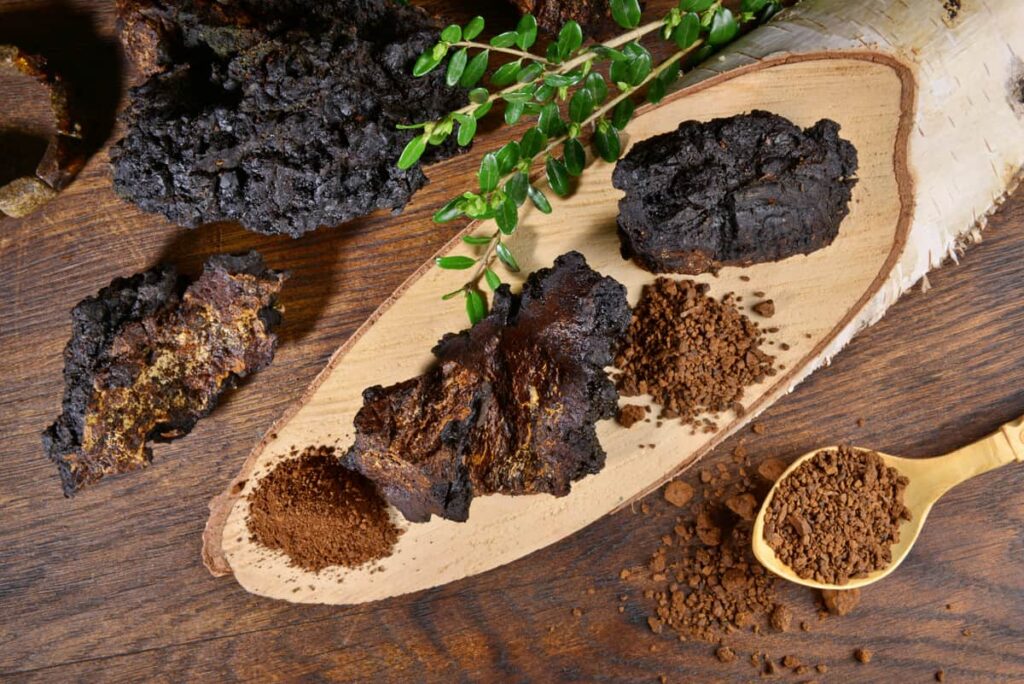Introduction
In the world of functional mushrooms, Chaga (Inonotus obliquus) stands as a remarkable and revered species with a rich history of use in traditional medicine. Known as the “King of Mushrooms,” Chaga has been cherished for centuries in various cultures for its potential health-promoting properties. As we embark on this comprehensive guide, we will delve into the historical context, the bioactive compounds within Chaga, and the diverse range of benefits it may offer for immune support, antioxidant protection, and overall well-being.
Historical Roots and Cultural Significance
Chaga’s history is deeply intertwined with traditional medicine in regions such as Siberia, Russia, and Northern Europe, where it has been used for centuries. Indigenous peoples have valued Chaga not only for its potential health benefits but also for its role in cultural and spiritual practices. Recognized for its robustness in harsh climates, Chaga has earned the nickname “Gift from the Forest” for its ability to thrive in inhospitable conditions.
Bioactive Compounds in Chaga
The health-promoting properties of Chaga are attributed to its rich composition of bioactive compounds, including:
- Beta-Glucans: Chaga contains beta-glucans, polysaccharides known for their immune-modulating effects. Beta-glucans play a crucial role in supporting the immune system’s response to pathogens.
- Polyphenols: Chaga is rich in polyphenols, including flavonoids and phenolic acids, which contribute to its antioxidant properties. These compounds help combat oxidative stress and protect cells from damage.
- Melanin: Chaga contains melanin, a pigment that has been linked to various health benefits, including its potential role in DNA protection and antioxidant activity.
- Triterpenes: Chaga is a notable source of triterpenes, which are believed to contribute to its anti-inflammatory and immune-enhancing effects.
Immune System Support
One of Chaga’s most celebrated benefits is its ability to support the immune system. The beta-glucans found in Chaga play a pivotal role in immune modulation, enhancing the activity of immune cells and promoting a robust defense against pathogens. Regular consumption of Chaga may contribute to overall immune resilience, helping the body ward off infections and illnesses.
Antioxidant Protection
Chaga’s potent antioxidant properties make it a valuable ally in combating oxidative stress. Oxidative stress occurs when there is an imbalance between free radicals and antioxidants in the body, potentially leading to cellular damage. The polyphenols in Chaga neutralize free radicals, offering protection to cells and tissues. This antioxidant capacity may contribute to overall cellular health and longevity.
Anti-Inflammatory Effects
Chaga has been studied for its potential anti-inflammatory effects, attributed in part to its triterpene content. Chronic inflammation is implicated in various health conditions, including autoimmune disorders and chronic diseases. By modulating inflammatory responses, Chaga may have a protective role in mitigating inflammation-related issues.
Balancing Blood Sugar Levels
Early research suggests that Chaga may have a role in supporting balanced blood sugar levels. While more studies are needed to establish definitive conclusions, the potential impact of Chaga on blood sugar regulation makes it a subject of interest for individuals concerned about metabolic health.
Cardiovascular Health
Chaga’s cardiovascular benefits are multifaceted, with potential impacts on heart health and vascular function. Some research suggests that Chaga may
- Lower Cholesterol Levels: Chaga has shown promise in reducing levels of LDL (“bad”) cholesterol, contributing to cardiovascular health by mitigating the risk of atherosclerosis.
- Regulate Blood Pressure: Preliminary studies indicate that Chaga may have blood pressure-regulating effects, potentially benefiting individuals with hypertension.
- Improve Endothelial Function: Endothelial dysfunction is a precursor to cardiovascular issues. Chaga’s potential to improve endothelial function may have implications for overall heart health.
Gastrointestinal Health
Chaga has been traditionally used to support digestive health, and emerging research suggests potential benefits for the gastrointestinal system. Some of Chaga’s effects on digestive well-being include
- Anti-Ulcer Activity: Studies have explored Chaga’s potential in protecting against gastric ulcers, indicating its gastroprotective properties.
- Balancing Gut Microbiota: Chaga may influence the balance of gut microbiota, supporting a healthy and diverse microbial community in the digestive system.
Potential Anticancer Properties
While research is still in its early stages, some studies suggest that Chaga may exhibit anticancer properties. The bioactive compounds in Chaga, particularly its triterpenes, have shown potential in inhibiting the growth of cancer cells. However, it’s essential to approach such findings with caution and await further clinical validation.
Adaptogenic Properties
Chaga is classified as an adaptogen, a category of substances that help the body adapt to stress and maintain balance. By supporting the body’s ability to cope with stressors, Chaga may contribute to overall resilience, both physical and mental.
How to Incorporate Chaga into Your Routine
Chaga is available in various forms, offering flexibility in how it can be incorporated into daily routines. Common forms include
- Tea: Chaga tea is a popular and traditional method of consumption. Dried Chaga pieces or powder can be steeped in hot water to create a soothing and earthy beverage.
- Tinctures: Chaga tinctures, typically alcohol extracts, provide a concentrated and easily absorbed form of Chaga. A few drops can be added to beverages or taken directly.
- Capsules or Tablets: Chaga supplements in capsule or tablet form offer a convenient and standardized way to integrate Chaga into your routine, especially for those who prefer a measured dosage.
- Powdered Extracts: Chaga mushroom extracts in powdered form can be added to smoothies, soups, or other culinary creations, providing a versatile option for consumption.
Considerations and Precautions
While Chaga is generally considered safe for most individuals, it’s essential to be mindful of certain considerations:
- Allergies: Individuals with allergies to mushrooms should exercise caution and, if necessary, consult with a healthcare professional before incorporating Chaga.
- Potential Interactions: Chaga may interact with certain medications, including anticoagulants and antiplatelet drugs. Consult with a healthcare provider, especially if you are taking medications that affect blood clotting.
- Individual Responses: As with any supplement or natural remedy, individual responses to Chaga may vary. Start with a lower dose and monitor how your body reacts.
Conclusion: Harnessing Chaga’s Potent Benefits for Holistic Wellness
In the realm of functional mushrooms, Chaga emerges as a potent and versatile ally in the pursuit of holistic well-being. Its rich history, coupled with contemporary scientific interest, positions Chaga as a treasure trove of potential health benefits. From immune support and antioxidant protection to cardiovascular health and potential anticancer properties, Chaga offers a comprehensive spectrum of advantages.
As you contemplate incorporating Chaga into your routine, whether through traditional tea, tinctures, or supplements, approach it with an informed perspective. Recognize that the multifaceted benefits of Chaga extend beyond immune support, encompassing various aspects of physical health and vitality. Consult with a healthcare professional to ensure that Chaga aligns with your health goals and complements your overall wellness journey.
In embracing Chaga, you embark on a journey to tap into the ancient wisdom of traditional medicine while exploring the cutting-edge insights of modern science. The “King of Mushrooms” beckons as a guardian of vitality, inviting you to unlock its potential and nurture your well-being from the inside out.

